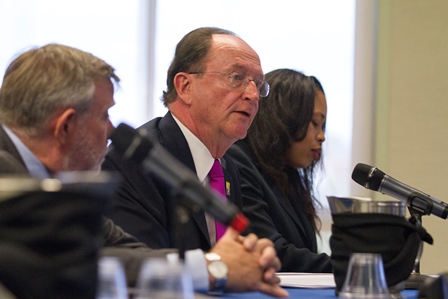
Camarillo, Calif., Oct. 7, 2013 – CSU Channel Islands (CI) President Richard R. Rush on Monday urged California lawmakers to ease burdens on college students and allow enrollment growth by restoring more than a half-billion dollars in funding to the CSU. In testimony before an oversight hearing of the California State Assembly's Higher Education Committee, Rush joined leaders from the state's public colleges and universities to explain the impact of affordability on student access and success.
"Despite tuition fee increases, the CSU remains an affordable option for students," Rush said. "We now need to make sure that the state funds enrollment growth if we are going to have the workforce, community leaders and economic strength we all want for our state in the future."
Rush was one of 10 asked to testify including representatives from CSU, UC and state community colleges regarding their views and recommendations on California's higher education affordability structure. The Assembly convened the hearing at UC Santa Barbara to illuminate current challenges from administrator and student perspectives and guide future law and policy.
"I'm tremendously impressed with the testimony here today," said Assemblyman Das Williams (D-Santa Barbara), Chair of the Committee on Higher Education. "Affordability is not meaningful if we don't have room for students. ... It is not going to happen without us increasing funding. I think this committee is pretty united in increasing that funding and we hope that will go forward."
President Rush told legislators that the most pressing concerns on campus are access and quality. Since the economic downturn, the CSU has had to turn away between 20,000 and 28,000 students each year. As a result, he said, the CSU serves more students than funding allows. State funding for 2012-13 equaled 1996-97 levels, but the CSU served an additional 90,000 students and was overenrolled by about 3 percent.
"What this means is that we are spending less and less on the academic programs and services students need and deserve to succeed," he said. "In order to serve additional students and help to meet the state's need for workers with baccalaureate degrees, the state will have to provide additional funding for enrollment growth."
Rush described how CI has worked to fill the gap in state aid through public-private partnerships, federal grants, and community support.
"We've found other ways of funding what we're trying to accomplish," he told the committee. "However, it's not sustainable."
He also urged the committee to increase funding to allow more students to transfer from community colleges. For the spring 2014 term, there were 15,000 eligible transfer students who were denied admission because the CSU did not have funding to accommodate them.
"This is particularly troubling, as the CSU and community colleges are putting a tremendous amount of energy in implementing SB 1440. We are creating thousands of seamless pathways for students to transfer with the expectation that if they meet transfer requirements that they will be admitted," he said. "My greatest worry is that we will not be able to take these students – and if we do, will they have the quality experience they deserve and need to succeed?"
Despite the gap in state support, the CSU has increased student graduation rates and remained an affordable option. According to testimony by Dean Kulju, Director of Financial Aid Services and Programs for the CSU, more than 72 percent of all CSU students receive some form of financial assistance and nearly 75 percent of undergraduate financial aid recipients have their fees fully covered by grants or waivers. Fifty-three percent of CSU students graduate without student debt.
"The increases in student tuition fees in recent years only made up for about half of state budget cuts," Kulju pointed out. "CSU's ongoing budget hole is more than a half-billion dollars. The cost of undergraduate education is now borne half by the state and half by the student."
Several CI students voiced their concerns during the hearing's public comment forum.
"Apathy amongst CSU students is a lie," said CI Student Government President Vanessa Bahena. "They are hungry and passionate for success. The bottleneck that the CSU system is facing is not only preventing them from going through the university but also from letting the university experience go through them. For those of you who have gone through the CSU system, I urge you to remember the struggles and barriers you faced and for those who have not gone through the CSU system, I urge you to explore the success stories of CSU graduates."
The Higher Education Committee will use the testimony to evaluate the success of existing budgetary and policy initiatives and guide legislators' future efforts. Other speakers at Monday's hearing were Henry T. Yang, Chancellor, UCSB; David Longanecker, President, Western Interstate Commission for Higher Education; Judy Heiman, Principal Analyst, California Legislative Analyst's Office; Jamillah Moore, Chancellor, Ventura County Community College District, and Commissioner, California Student Aid Commission; Brad Hardison, Director of Financial Aid, Santa Barbara City College; Michael Miller, Financial Aid Director, UCSB; Debbie Cochrane, Research Director, The Institute for College Access and Success; Alfonso Levi Palencia, Student Trustee, Santa Barbara City College; Sarah Couch, President, California State Student Association; and Alexandria Thush Choate, External Vice President of Statewide Affairs, UCSB.
For more information on the California Assembly Committee on Higher Education, visit Assemblyman Das Williams' website at http://www.asmdc.org/members/a37/.
# # #
About California State University Channel Islands
CSU Channel Islands(CI) is the only four-year, public university in Ventura County and is known for its interdisciplinary, multicultural and international perspectives, and its emphasis on experiential and service learning. CI’s strong academic programs focus on business, sciences, liberal studies, teaching credentials, and innovative master’s degrees. Students benefit from individual attention, up-to-date technology, and classroom instruction augmented by outstanding faculty research. CI has been designated by the U.S. Department of Education as a Hispanic-Serving Institution and is committed to serving students of all backgrounds from the region and beyond. Connect with and learn more by visiting CI's Social Media.
